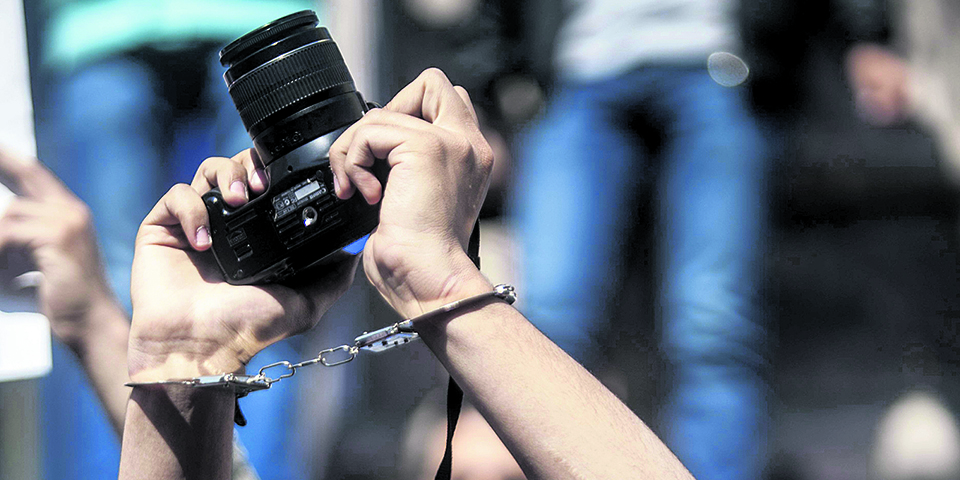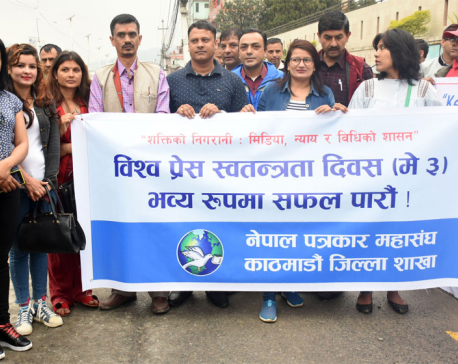
OR

As we celebrated World Press Freedom Day on May 3, Nepal’s position in the World Press Freedom Index – an assessment of the entire eco-system in which journalists operate – remained unchanged at 106 out of a total of 180 countries. But with darker clouds over the horizon, this ranking may yet take a turn for the worse over the course of the next year as the Oli government stealthily but surely takes measures to muzzle freedom of expression and journalistic autonomy in the name of protecting privacy.
Indeed this was the primary concern voiced by the annual report released by the International Federation of Journalists (IFJ), in partnership with the Federation of Nepali Journalists (FNJ), last Friday. Certain sections of the new Civil and Criminal Codes have criminalized activities that are the bread and butter of investigative journalism – exchanging or publishing information on public figures and on matters that are in the wider public interest. These privacy sections and provisions are a thinly veiled attempt to stop criticism of politicians and those in power and curb what is deemed to be unfavorable reporting.
The one particular clause that seeks to criminalize “receiving or sending unauthorized information or messages through an electronic medium” was ostensibly done to curb spread of information through social media (one suspects that this followed on from the “Marsi” rice episode) but it’s quite another thing to go about enforcing it when news and content spread like wildfire over the internet. What will really happen (and is already happening) is that these provisions will be used to selectively target and harass journalists and writers seeking to uncover and disseminate news that may go against the party and its top brass.
The Civil and Criminal Codes, of course, is the not the only weapon being looked at by the government – the draft of the Information and Technology bill seeks to fine purveyors of “improper posts” on social media an eye watering maximum amount of Rs 1.5 million.
When you look at some of the laws in Nepal, you could get away with anti-social business practices to even more dastardly crimes for a laughable fine of a few thousand rupees or a couple of months in jail – aka a slap on the wrist for “real” crimes. In this context and viewed with these lens, this amount more than anything really lays bare the “we will teach the media a lesson for targeting us” mentality of the current government.
It’s the liberal interpretation of these clauses – for example anything and everything could constitute an improper social media post – that has the potential to really muzzle free thought and expression. In the recent past, this sort of interpretation has been wielded quite frequently by a government that believes its members should be above the law to subjugate and intimidate journalists under the Electronic Transactions Act.
This arbitrary digital surveillance of reports and reporters in Nepal is part of a broader global trend of press distrust and vilification – from Trump’s tirades against the media to the oft-repeated “presstitute” slur in India. If those in power are challenged or held accountable, it is all too easily dismissed as “fake news”. Ironically it is often the mainstream media that is often called on to validate or repudiate news from or on social media feeds.
Journalism and the media at large only become a problem when truth is spoken to power, uncomfortable questions are asked and the government is held accountable. And it is very evident to see it playing out in Nepal – from the attempts at implementing draconian legislative measures to express gag orders on state media institutions to not only prevent news dissemination (on the
Nirmala Panta case or Dr KC’s hunger strikes) but actively counter and discredit factual reporting.
As I write this, the government has presented the Media Council Bill to parliament and in doing so has acted without any pretense to democratic practices. One can only speculate what is in the act, given all the subterfuge in getting it passed through parliament, but judging from recent trends it’s best to be pessimistic.
gunjan.u@gmail.com
You May Like This

Political cloud over media: how detrimental to press freedom?
KATHMANDU: "Citizens need facts, not fake news and propaganda. Most of all they need reliable media working in a transparent... Read More...

Free the press
Should the draft bill with provisions of harsh penalties and prison terms be passed, it will discourage professional journalism, while... Read More...

Rally held to mark World Press Freedom Day
KATHMANDU, May 3: A rally was taken out this morning to mark the occasion of the World Press Freedom Day 2018. Read More...







Just In
- NRB to provide collateral-free loans to foreign employment seekers
- NEB to publish Grade 12 results next week
- Body handover begins; Relatives remain dissatisfied with insurance, compensation amount
- NC defers its plan to join Koshi govt
- NRB to review microfinance loan interest rate
- 134 dead in floods and landslides since onset of monsoon this year
- Mahakali Irrigation Project sees only 22 percent physical progress in 18 years
- Singapore now holds world's most powerful passport; Nepal stays at 98th











Leave A Comment